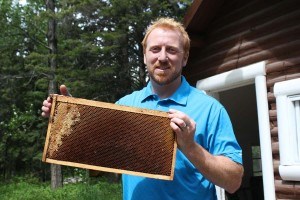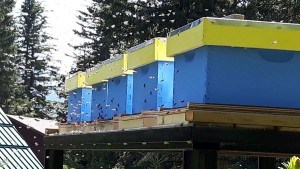
The Overlander Mountain Lodge has been abuzz with activity over the past few weeks after the hotel welcomed the arrival of 36,000 European honeybees.
With six hives, the hotel expects the population to peak at 360,000 bees by mid-season before the population dwindles again for the winter.
“I would estimate right now there’s already 60,000 bees, but within three weeks we figure it’s going to be between 45,000 and 60,000 bees in each hive,” said Cory LeDrew, the hotel’s general manager who spearheaded the initiative.
To host the bees, which arrived on May 24, the hotel built a 10-foot platform about 500 metres from the hotel in an area surrounded by wildflowers. Guests are encouraged to visit the hives and can even get within a few feet of the bustling insects.
“Bees are fascinating,” said LeDrew, who started a similar project at the Fairmont Jasper Park Lodge as an executive sous chef in 2014.
“It brings people together and makes them realize how important honeybees are.
“When people come in the hotel and start reading the information and look at the honey, I see young adults turn into kids right away. They just can’t believe they get to see all these honeybees.”
Since the early 2000s, honeybee populations have been in decline raising concerns about the impact the loss could have on the global food supply.

According to the Canadian Association of Professional Apiculturists (CAPA), which has been tracking bee mortality since 2007, Canada’s honeybee population did slightly better in 2015 than previous years, but the overall trend indicates a declining population.
In Alberta, which has the most colonies, nearly 11 per cent of colonies did not survive the winter, slightly better than the national average of 16.4 per cent, according to CAPA’s 2015 survey.
The report noted that the winter loss in most provinces was within the acceptable range by beekeepers.
Experts are not sure why the population is in decline, but weather is considered a major factor. There is also increasing evidence linking the use of neonicotinoid pesticides, a widely used class of chemical, to the loss of bees and other pollinators that are vital to the food supply.
Back at the hotel, LeDrew expects each hive to produce approximately 110 to 180 pounds of honey, depending on the season and weather conditions.
The hotel uses the honey for a variety of different things from making signature cocktails to using it in its dinner menu. The general store at the Jasper East Cabins, which is also owned by the hotel, also sells jars of unpasteurized honey for $10. One dollar for every jar of honey that is sold will be used to plant native wild flowers in the area.
The beehives are part of the hotel’s plan to become as sustainable as possible.
According to LeDrew, the hotel has plans to build several greenhouses to grow its own vegetables and even has plans to purchase a parcel of land for its own cattle.
“Our major goal is be self-sustainable. We want to be able to provide all the food in the restaurant as much as we can from the hotel,” said LeDrew, who encouraged the general public to stop by and check out the hives.
Paul Clarke
[email protected]
